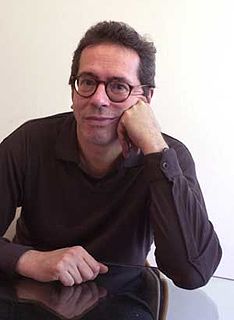A Quote by Jose Ortega y Gasset
The metaphor is perhaps one of man's most fruitful potentialities. Its efficacy verges on magic, and it seems a tool for creation which God forgot inside one of His creatures when He made him.
Related Quotes
The metaphor is perhaps one of man's most fruitful potentialities. Its efficacy verges on magic, and it seems a tool for creation which God forgot inside one of His creatures when He made him. All our faculties keep us within the realm of the real, of what is already there. The most we can do is to combine things or break them up. The metaphor alone furnishes an escape; between the real things, it lets emerge imaginary reefs, a crop of floating islands.
We have the right to rid our houses of ants; but what we have no right to do is to forget to honor the ant as God made it, out in the place where God made the ant to be. When we meet the ant on the sidewalk, we step over him. He is a creature, like ourselves; not made in the image of God, it is true, but equal with man as far as creation is concerned. The ant and the man are both creatures.
Man is sitting disconsolate on an anthill one morning. God asks him what the matter is and man replies that the soil is too swampy for the cultivation of the yams which God has directed him to grow. God tells him to bring in a blacksmith to dry the soil with his bellows. The contribution of humanity to this creation is so important. God could have made the world perfect if he had wanted. But he made it the way it is. So that there is a constant need for us to discuss and cooperate to make it more habitable, so the soil can yield, you see.
Our age is one in which usefulness is thought to be the chief merit of nature; in which the attainment of power, the utilization of its resources is taken to be the chief purpose of man in God's creation. Man has indeed become primarily a tool-making animal, and the world is now a gigantic tool box for the satisfaction of his needs.
sometimes a man stands up during supper and walks outdoors, and keeps on walking, because of a church that stands somewhere in the East. And his children say blessings on him as if he were dead. And another man, who remains inside his own house, stays there, inside the dishes and in the glasses, so that his children have to go far out into the world toward that same church, which he forgot.
Education is identical with helping the child realize his potentialities. The opposite of education is manipulation, which is based on the absence of faith in the growth of potentialities and the connection that a child will be right only if the adults put into him what is desirable and suppress what seems to be undesirable.
A man's magic demonstrates what sort of person he is, what is held most deeply inside of him. There is no truer gauge of a man's character than the way in which he employs his strength, his power. I was not a murderer. I was not like Victor Sells. I was Harry Blackstone Copperfield Dresden. I was a wizard. Wizards control their power. They don't let it control them. And wizards don't use magic to kill people. They use it to discover, to protect, to mend, to help. Not to destroy.
By His gracious condescension God became man and is called man for the sake of man and by exchanging His condition for ours revealed the power that elevates man to God through his love for God and brings God down to man because of His love for man. By this blessed inversion, man is made God by divinization and God is made man by hominization. For the Word of God and God wills always and in all things to accomplish the mystery of His embodiment.
The very beginning of Genesis tells us that God created man in order to give him dominion over fish and fowl and all creatures. Of course, Genesis was written by a man, not a horse. There is no certainty that God actually did grant man dominion over other creatures. What seems more likely, in fact, is that man invented God to sanctify the dominion that he usurped for himself over the cow and the horse.
Creation is thus God's presence in creatures. The Greek Orthodox theologian Philip Sherrard has written that "Creation is nothing less than the manifestation of God's hidden Being." This means that we and all other creatures live by a sanctity that is inexpressibly intimate, for to every creature, the gift of life is a portion of the breath and spirit of God. (pg. 308, Christianity and the Survival of Creation)
Fear is the tool of a man-made devil. Self-confident faith in one's self is both the man-made weapon which defeats this devil and the man-made tool which builds a triumphant life. And it is more than that. It is a link to the irresistible forces of the universe which stand behind a man who does not believe in failure and defeat as being anything but temporary experiences.








































